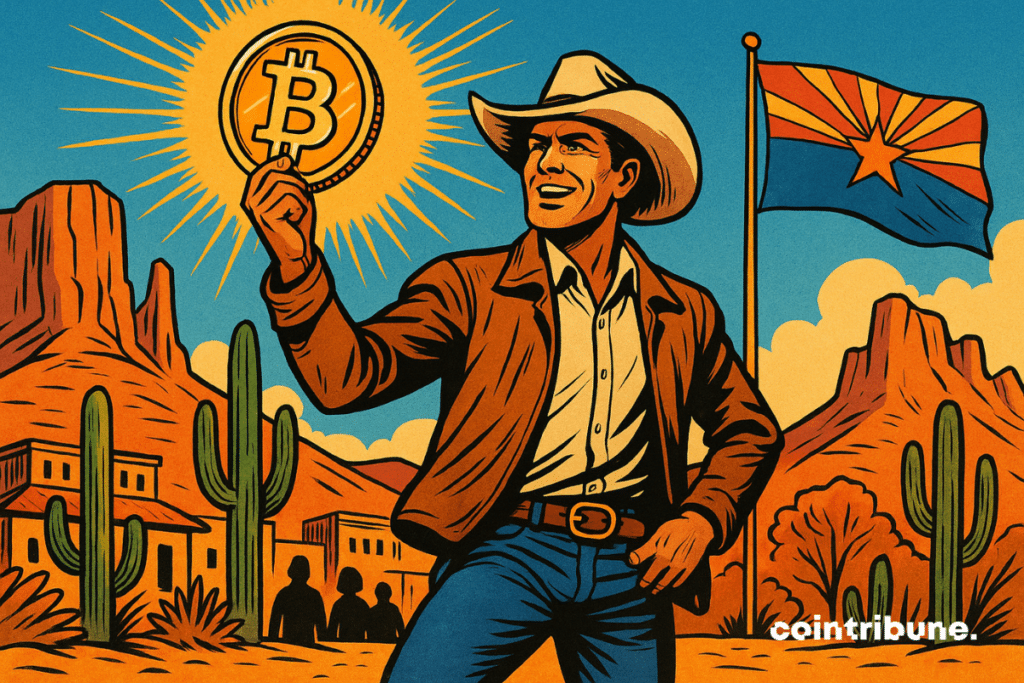Arizona Just Made Bitcoin Official State Business—Wall Street’s Old Guard Won’t Like This
Move over gold reserves—Arizona just became the first US state to add Bitcoin to its treasury. The move slashes through bureaucratic red tape like a hot knife through butter, setting a precedent that could force other states to play catch-up.
Why it matters: When governments start hodling, the ’magic internet money’ narrative gets harder to dismiss. Arizona’s treasury now moonlights as a crypto cold wallet—take that, legacy finance dinosaurs still arguing about ’intrinsic value.’
The fine print: This isn’t some token political gesture. The state’s reportedly allocating 1-3% of its reserves into BTC, a hedge strategy that’d make Ray Dalio raise an eyebrow (before quietly repositioning his own portfolio).
Bottom line: The institutional dam is breaking—while Wall Street suits debate ETF fees, Arizona just rewrote the playbook. Cue the inevitable backlash from bankers who still think blockchain is a type of ski binding.

In Brief
- Arizona could become the first U.S. state to have a bitcoin reserve, with an investment of 10% of its public assets.
- The approved bill authorizes investment of up to $3.14 billion in cryptocurrencies, including bitcoin and NFTs.
- This initiative could push bitcoin to $106,000 in the short term and up to $210,000 by the end of 2025, according to analyst forecasts.
Innovative Legislation for a Bitcoin Reserve
The Arizona Senate recently approved bills 1025 and 1373 that authorize the investment of 10% of the state’s public assets into digital assets such as bitcoin and NFTs. This measure could see the state invest up to $3.14 billion in these assets. Additionally, a strategic digital asset reserve, the “Digital Assets Strategic Reserve Fund“, will be created to manage these investments, using seized cryptocurrencies and future budget allocations. This fund will benefit from full transparency through blockchain auditability and strict risk control.

This bill could mark a turning point in how governments manage their public reserves. Indeed, Arizona is drawing inspiration from similar strategies seen in other states like Texas and Florida, which are also exploring the integration of bitcoin into their public finances. If the bill is signed by Governor Katie Hobbs, Arizona will become the first state to hold BTC in its public funds.
A Revolution for the Crypto Market
With this decision, Arizona could quickly become one of the largest institutional holders of bitcoin among U.S. public entities, after the city of Miami. This move is seen as a strong signal to the markets, highlighting the growing acceptance of BTC as a sovereign and secure asset for public reserves. The potential impact on the Bitcoin market could be significant, especially with an investment of this magnitude.
Indeed, a bitcoin reserve of $3.14 billion could exert significant upward pressure on the market. Currently at $94,955, some analysts believe that such institutional investments could push bitcoin to $106,000 in the short term, or even up to $210,000 by the end of 2025, according to Peter Chung’s forecasts. Thus, Arizona’s initiative could not only strengthen the legitimacy of BTC as a sovereign asset but also catalyze a substantial appreciation in its value.
BTCUSD chart by TradingViewArizona could soon become a pioneer in integrating bitcoin within American public finances. By allocating part of its assets into cryptocurrencies, the state is opening the way to a new era for sovereign reserves. The focus is now on Governor Hobbs’s decision, which could seal this historic first and follow in the footsteps of Trump, by making BTC a state asset.
Maximize your Cointribune experience with our "Read to Earn" program! For every article you read, earn points and access exclusive rewards. Sign up now and start earning benefits.

